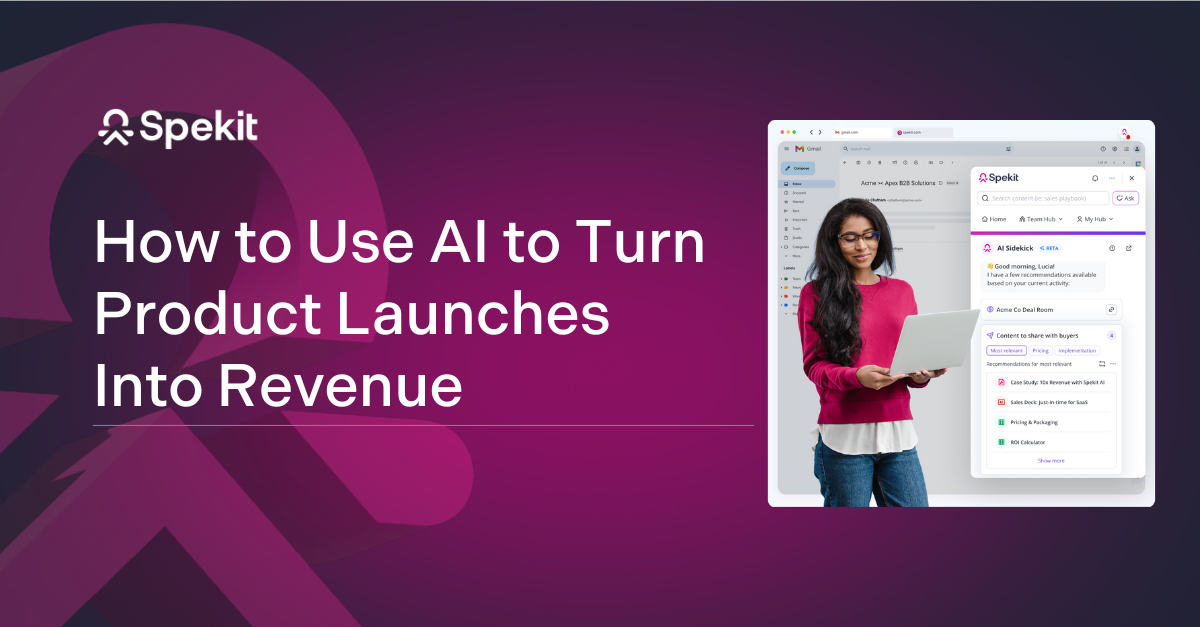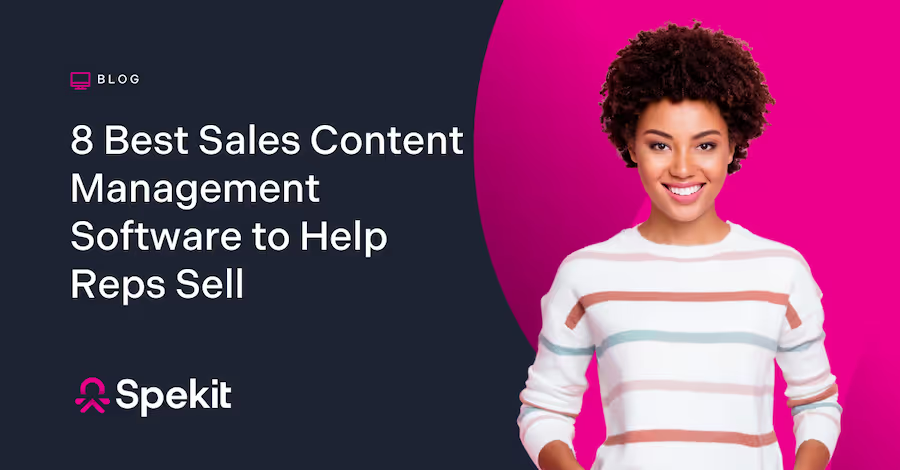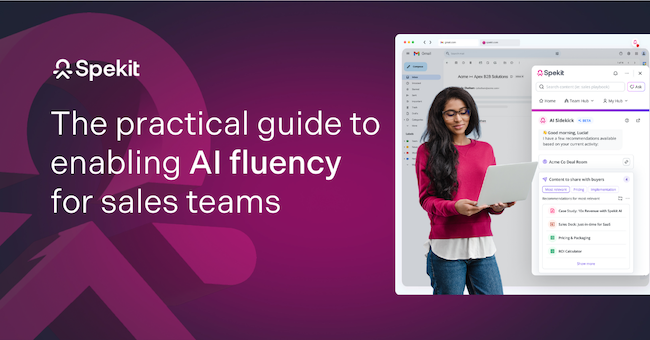Take a peek at your sales team's screens right now. How many tabs do they have open? Ten? Twenty?
Every one of them is a detour. Reps are constantly bouncing between tools—digging through decks, Slack threads, and call recordings—just to prep for a single conversation.
No wonder reps spend less than 30% of their time actually selling.
Even worse? When they finally find the collateral they need, there's no guarantee it's current, complete, or even correct.
Traditional sales enablement tools try to fix this by adding yet another dashboard...one more place to check, update, and eventually ignore.
AI sales enablement platforms change this approach entirely: instead of adding to the pile, they insert knowledge directly into the rep’s flow of work.
Spekit CEO and Founder Melanie Fellay describes it as surfacing the “exact right content at the right time in the employees’ workflow.”
Let’s break that down.
The big shift: Introducing AI into sales enablement connects reps to the right content at the right time
The real power of AI in sales enablement is delivering the right content, at the right time.
Traditional enablement puts the burden on reps to go find the info they need. AI flips that. Instead of pulling information, reps get it pushed to them. In the moment they need it, inside the tools they’re already using.
That shift—from pull to push, from memory to moment—is what actually drives results.
But timing alone isn’t enough; a generic call script sent after every discovery call qualifies as good timing after all.
The real differentiator is context.
AI in sales enablement doesn’t just guess. It learns what reps are working on, what’s worked in the past, and when they’re likely to need help. It then delivers content that’s not only timely, but relevant, personalized, and instantly actionable.
A battle card that surfaces mid-call when a lead mentions a competitor? That's perfect timing + strong context.
Together, timing and context transform enablement from a static library into a dynamic advantage.
And this shift isn’t a future state, it’s already here. According to the Sales Enablement Landscape Report, 80% of sales enablement teams already use AI at least occasionally in their daily work. And 25% rely on it regularly.
AI in enablement is how modern enablement teams stay ahead today.
6 use cases for AI in sales enablement (here's how AI solves common sales enablement headaches)
AI can’t close deals for your reps. But AI sales enablement platforms can solve the blockers that stop deals from closing.
1. AI keeps content clean, current, and conflict-free
Content decay shows up in small but costly ways. A rep sends a case study to a prospect, only to realize later it includes a sunsetted feature.
Another shares a pricing slide during a call, but it’s two versions old, and the numbers no longer reflect current offers. Someone drops a Google Doc into Slack to help a teammate prep—but it turns out to be version 7 of 11, and half the info is outdated.
These daily speed bumps erode rep confidence, waste buyer attention, and slow down deals.
AI steps in as a content quality control system:
- It spots duplicate or contradictory content in your CMS,
- Flags anything that’s out of sync with your CRM or product updates; and
- Proactively recommends the best version of what’s already working.
Here’s how Spekit uses AI to keep your content organized, up to date, and ready to deliver—right when your reps need it.
1. Sync everything in one place.
First, Spekit connects to the content sources your team already uses, such as Google Drive, SharePoint, and Confluence. It pulls in everything from PDFs and Docs to training materials and battle cards.
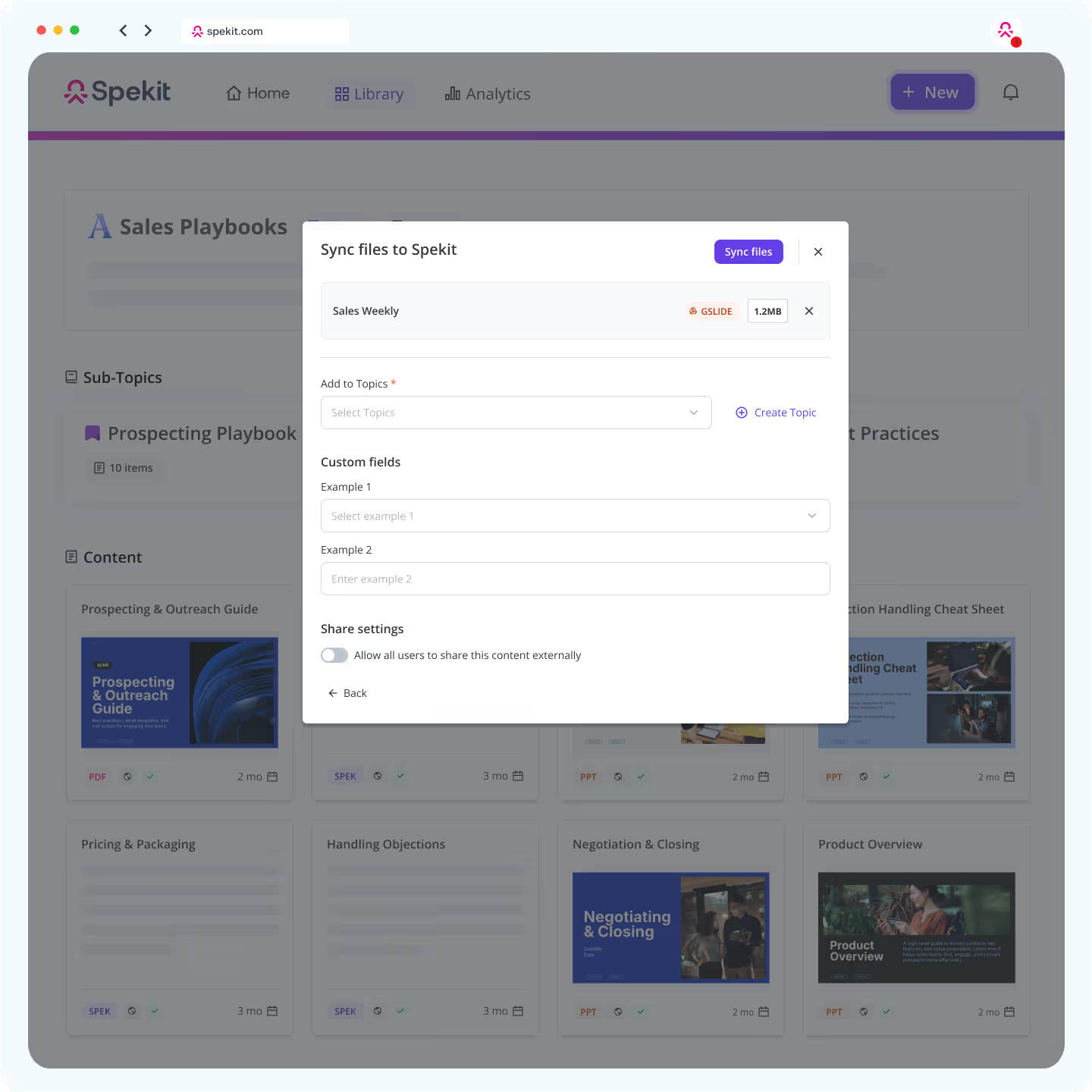
2. AI-powered deduplication flags conflicting or outdated content.
As soon as content is pulled in, Spekit’s AI kicks in. It scans for duplicates, conflicting information, or stale versions that might confuse your reps.
You’ll get a notification when something needs review, before it causes problems in the field.
3. Automated content governance runs in the background.
You don’t have to micromanage every doc or keep a manual spreadsheet of updates.
Spekit monitors your content continuously and helps you set rules for version control, visibility, and expiration, so nothing gets shared past its prime.
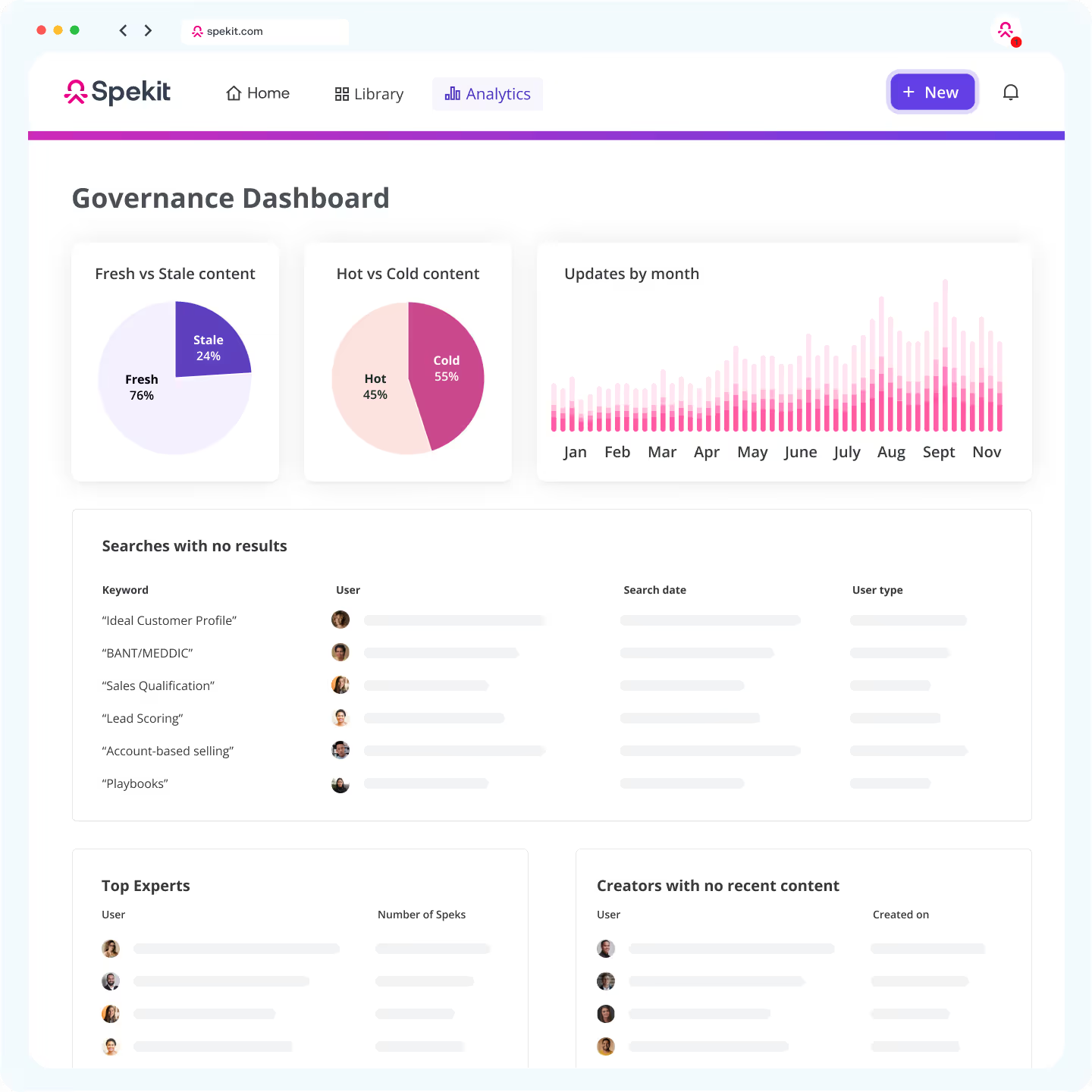
Clean content doesn’t sit in a folder. It shows up where it’s needed—like Salesforce, Gmail, or Slack—automatically.
So even if a rep never visits the content library, they’re still getting the latest, most accurate information.
2. AI turns onboarding into real-time reinforcement
A new hire gets a two-week crash course, then spends the next three months pinging their manager for links they vaguely remember from training.
They forget where the demo checklist lives. They miss a key step in discovery. And nobody catches it until a deal falls apart.
AI sales enablement platforms turn onboarding into everboarding—replacing static training with dynamic, real-time reinforcement.
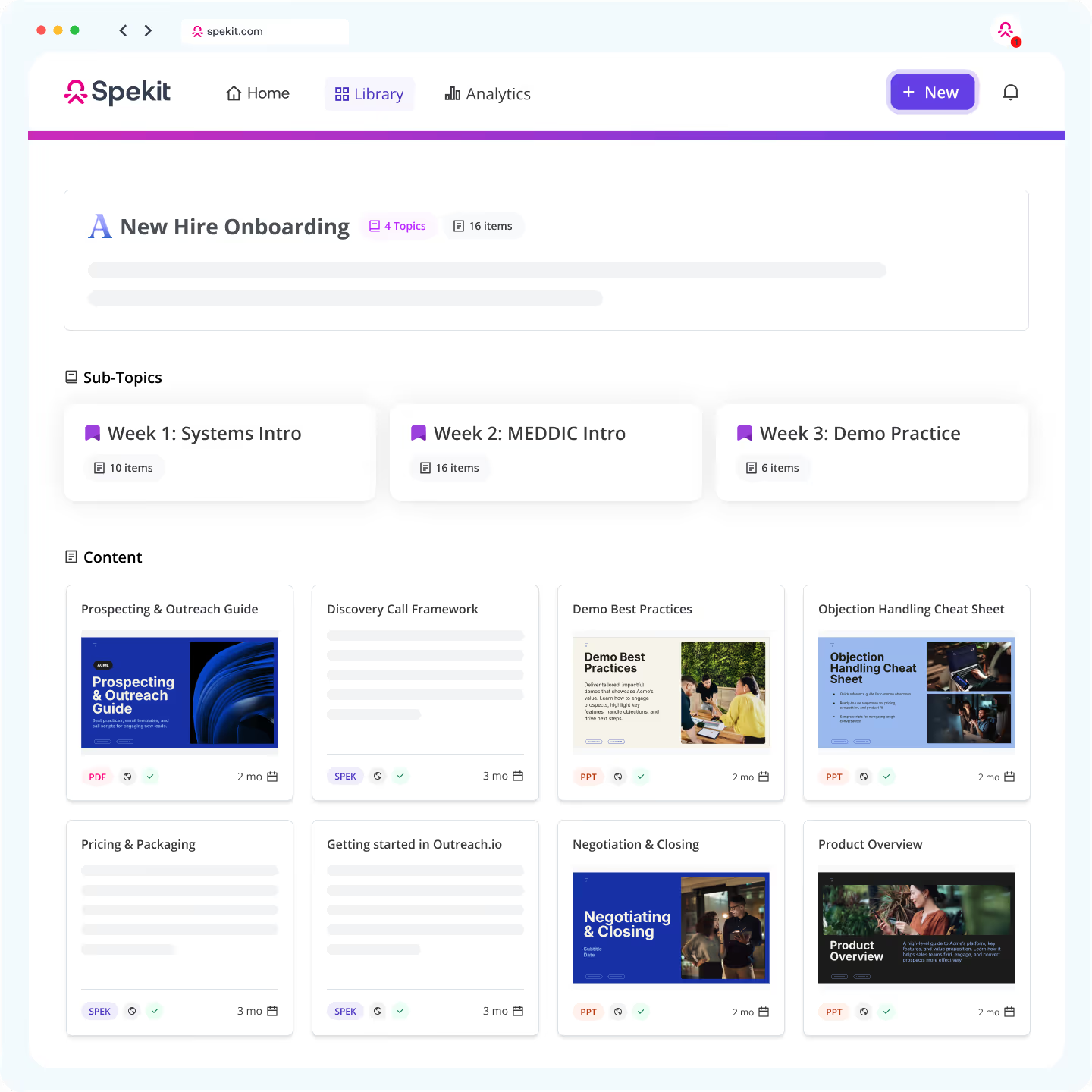
For example, Spekit enables you with:
- Building modular playlists that grow with your reps: Build onboarding tracks by role, product, or deal stage. Reps can work through bite-sized lessons at their own pace, with visible progress tracking and the ability to update content anytime, without rebuilding.
- In-the-moment training nudges: When a rep opens Salesforce for the first time, Spekit automatically serves up onboarding guidance specific to that field or object.
- Contextual reinforcement at key stages: Move a deal to the demo stage? Spekit delivers best practices for discovery calls, talk tracks, and qualification checklists—right inside the tools reps are using.
3. AI enforces consistency across teams and talk tracks
Sales leader A calls a deal “qualified” after a cold call.
Sales leader B waits until there’s a mutual action plan.
One team leads with a new feature. Another forgets it exists.
This kind of inconsistency breaks forecasts, confuses buyers, and makes scaling a mess.
AI fixes this by standardizing how your processes are communicated—and making sure everyone sees the same message, in the same way, at the same time.
For example, with Spekit, you get:
1. Modular content blocks (Speks).
Every definition, checklist, video, or case study lives inside a Spek—a bite-sized, searchable unit of knowledge. Instead of digging through different folders, reps access the full context (and the latest version) in one click.
2. In-field definitions and tooltips.
Confused about what counts as “qualified”? Spekit surfaces that exact definition—right next to the field in Salesforce—so reps don’t guess or have to ask a manager.
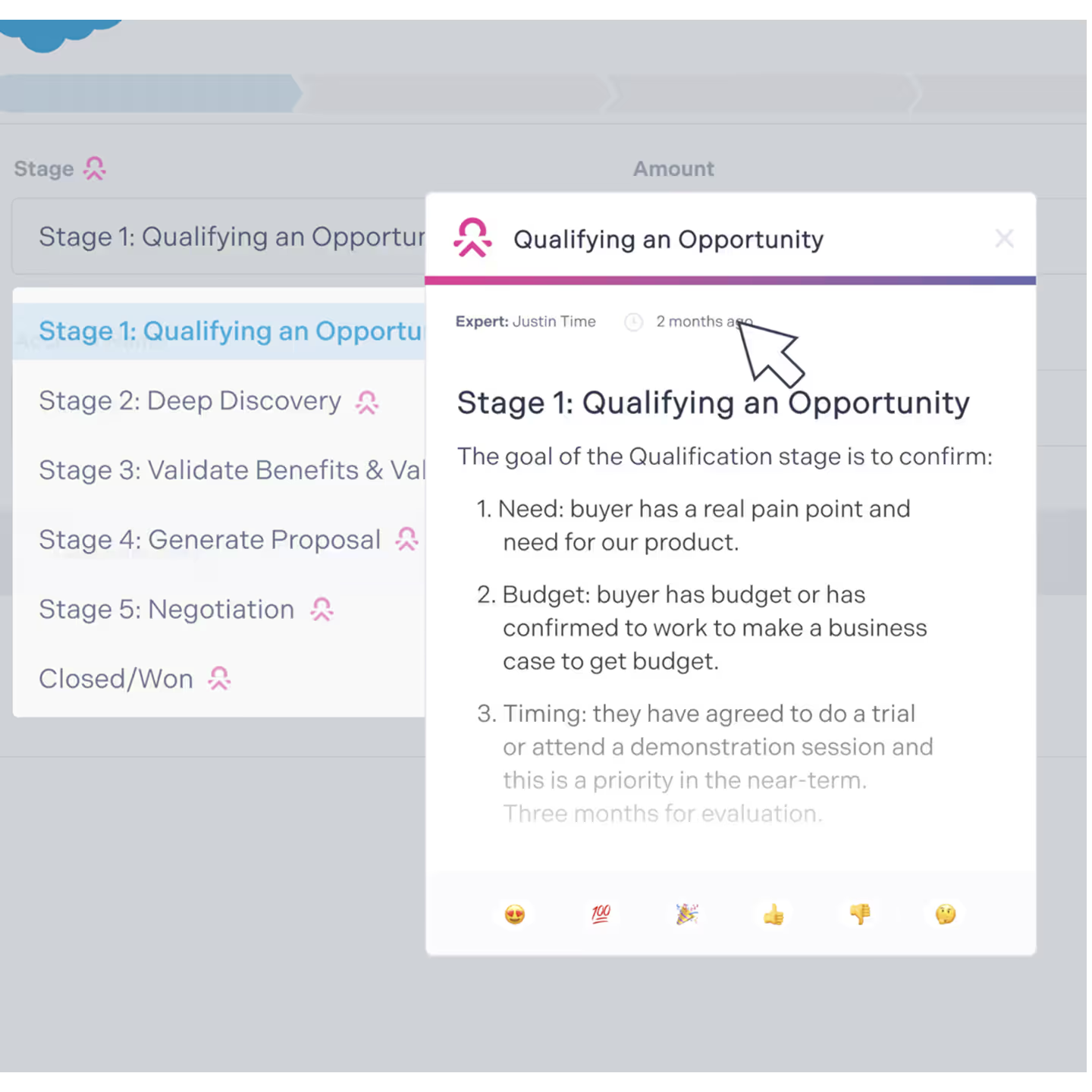
3. Process-aligned playbooks, triggered by context.
You can turn frameworks like MEDDIC or BANT into step-by-step guides, then use AI to surface the right piece at the right time.
When a rep hits a new deal stage, they don’t get a document—they get live, contextual help.
4. Live updates across every channel.
The moment messaging or process changes, Spekit updates it everywhere—Slack, Salesforce, Gmail, Chrome—without asking reps to re-learn or re-download anything.
4. AI replaces searching with instant, in-context answers
Your rep needs a one-pager for a manufacturing CFO.
They open Slack, search the drive, ping a teammate, skim four versions…and the call’s already started.
This is what tab fatigue looks like—and it kills momentum.
AI sales enablement tools read the room—deal stage, persona, conversation notes—and deliver what’s needed before the rep even clicks.
For example, Spekit flips content discovery from a conscious hunt to an unconscious experience.
1. Think Spotify for sales content: modular, searchable, and always ready to queue up the perfect resource.
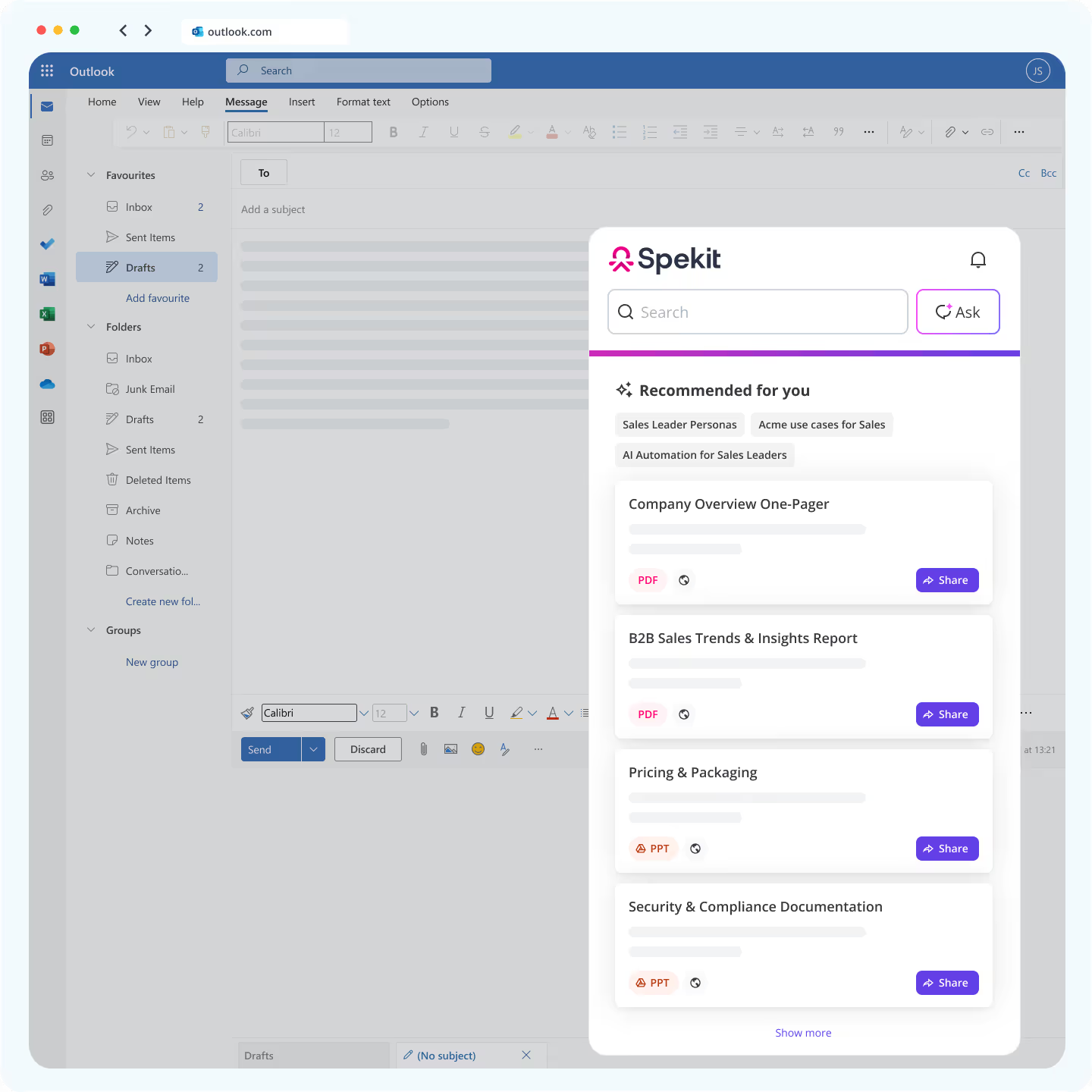
Whether your reps are prepping for a call in Gmail, sending a proposal from Salesforce, or replying to a prospect in Slack, Spekit meets them where they are. Not the other way around.
2. AI surfaces tailored content based on the rep’s tool, task, and context.
Call coming up? It recommends a case study, pitch deck, and talking points automatically. Need to respond to an objection in Outlook?
The right battle card appears without leaving your inbox.
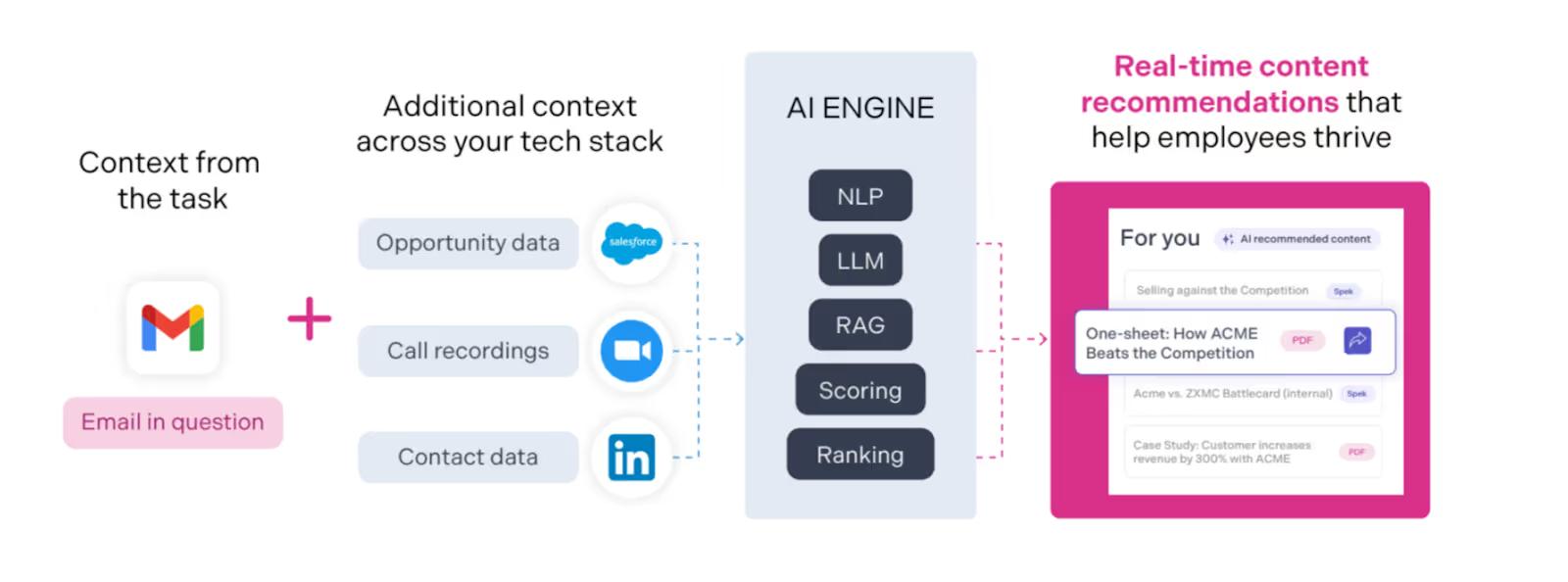
Say a rep finishes a great discovery call. Now, the buyer wants examples of similar customer success stories.
The old way: The rep digs through Chorus to review the call, realizes they need a case study, opens a dozen tabs, pings Marketing in Slack, then waits.
The Spekit way: Spekit AI analyzes the call summary, identifies the intent, and immediately serves up a high-performing case study from a similar industry, ready to send.

5. AI scales coaching without adding headcount
Sales coaching works, but it doesn’t scale. Managers don’t have time to review every call, spot every gap, or deliver personalized feedback to every rep.
In a recent sales training survey we ran with JB Sales, 67% of reps said a lack of reinforcement after a session hurt their ability to apply what they learned. Another 18% said they were overwhelmed by too much information at once.

AI sales enablement tools change that by analyzing conversations at scale, spotting common breakdowns, and delivering bite-sized nudges that reinforce the right behavior, right when it’s needed.
For example, with Spekit:
- AI identifies coaching moments: It analyzes rep conversations, flags recurring objections or missed opportunities, and suggests follow-up actions or resources.
- Reps get just-in-time reinforcement: Reps receive micro-lessons in the moment, like a quick refresher on handling pricing pushback after a rough call.
- Reps get built-in Knowledge Checks: You can embed short quizzes inside any app to assess retention and reinforce learning, without breaking flow.
- No more waiting for 1:1s: Instead of waiting for a manager to review a call, reps get immediate guidance to correct course in real time.
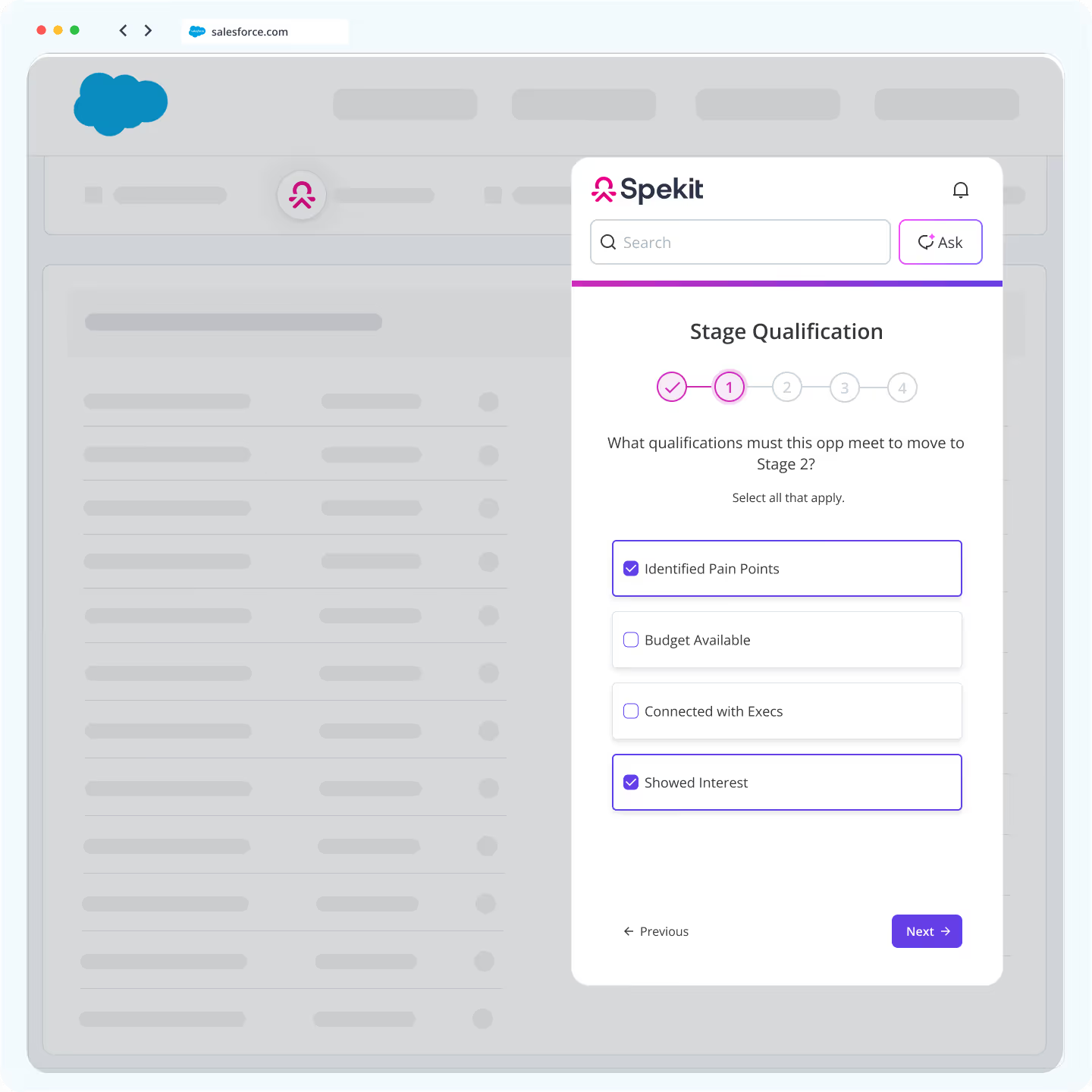
6. AI turns institutional knowledge into team-wide advantage
Your most valuable sales insights are often hiding in plain sight—tucked in Slack threads, buried in call recordings, or shared in passing during a team huddle. The problem is that they never make it into playbooks or formal training.
AI sales enablement tools helps you capture frontline knowledge as it’s happening and turn it into something every rep can use. What one person figures out mid-deal can now become a teamwide asset—automatically.
For example, with Spekit, you can:
- Capture what’s working: AI can turn a rep’s Slack message or call snippet into a first draft of a battle card, objection-handling doc, or process walkthrough—without waiting for a content team.
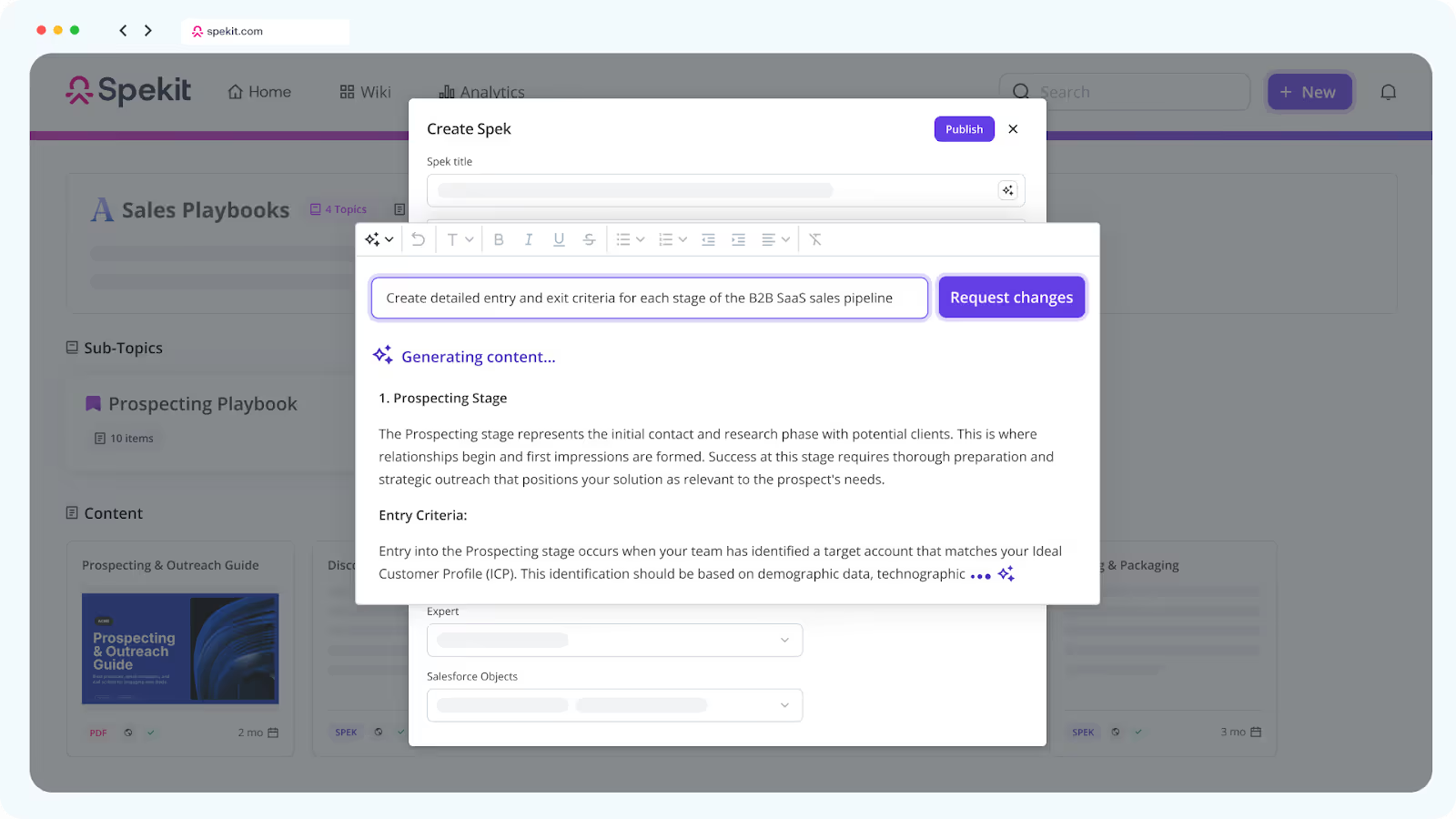
- Refine and scale fast: From that raw input, you can instantly clean up, format, and distribute the insight across your team. That one golden nugget? It’s now a searchable, clickable resource inside the tools reps use every day.
- Keep content current: As market conditions shift or new insights emerge, AI helps you quickly update shared knowledge so it stays current and useful.
What used to take a training session now takes a few clicks—and when one rep figures something out, the whole team has access to it too.
3 AI sales enablement platforms to help you close more deals
There are now hundreds of sales enablement software out there that claim to use AI to improve sales outcomes and make sales enablement team’s life easier. Below are three we believe are actually getting it right.
1. Spekit: Real-time, in-the-flow enablement software
Best for: Spekit's AI sales enablement platform is best for teams that need enablement to show up where and when reps work, not just live in an obscure folder that's never used..
Reps forget what they learned and can’t find what they need. Spekit solves this by embedding bite-sized training, process guidance, and content recommendations into every app reps already use.
And that’s why real users LOVE us:

Key features:
- A central content management hub for all your enablement: Spekit's CMS uses AI to make sure your content stays organized, up-to-date, and distributed.
- AI-powered content recommendations: Surfaces high-performing sales content (like decks or case studies) next to any call, email, or CRM update based on rep behavior and deal context.
- Real-time updates + alerts: Push new content or process changes instantly, with in-app notifications and emails to make sure nothing gets missed.
- Lightning-fast content creation: Use Spekit AI to summarize, rewrite, or translate content in seconds. Build training materials, battlecards, and field guides from a single sentence.
- Out-of-the-box playbooks: Get started fast with proven templates for MEDDIC, BANT, objection handling, product walkthroughs, and more.
- Feedback and visibility: See who’s engaging with training, what’s working, and where reps need more support. Capture in-the-moment feedback to continuously improve.
🔥 Real-life success story: ZoomInfo used Spekit to embed enablement directly into reps’ workflows, tripling engagement with training content and unlocking millions in new sales pipeline.
“When we calculated the impact based on average sales price, we realized we had recovered millions of dollars in pipeline,” Luke Martin, Senior Manager of Revenue Enablement Infrastructure & Operations, says. “And the best part? We could directly attribute it back to our enablement efforts.”
Forget the hassle of managing a patchwork of integrations. With the Spekit Chrome Extension, you can instantly surface knowledge, training, and answers directly in the tools your reps already use from Salesforce to Gong, Outreach, Gmail, and more. And when you want even deeper functionality? Spekit offers native integrations and expanded capabilities that take the experience even further:
- CRM: Salesforce, HubSpot
- Conferencing and call intelligence: Gong, ZoomInfo
- Telephony and sales engagement: Outreach, Salesloft
- Email and communication: Outlook, Gmail, Slack
- Content repositories: Google Drive, SharePoint, Confluence
- Identity and access management: Ping One, Okta, Microsoft Azure, Salesforce, OneLogin
- Video and training: Loom
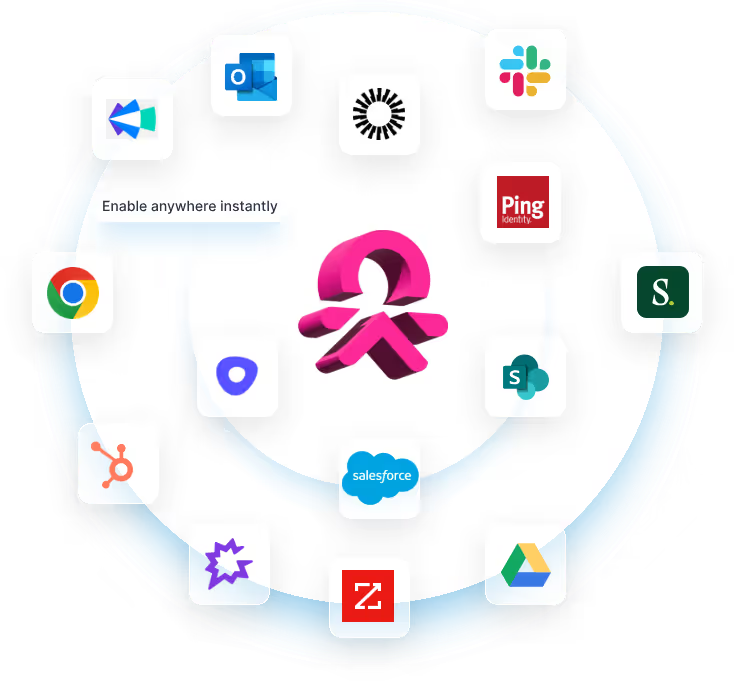
Pricing: Available upon request.
2. Gong
Best for: Enablement and Rev Ops leaders who want deep post-call analysis but have a separate solution for just-in-time enablement.
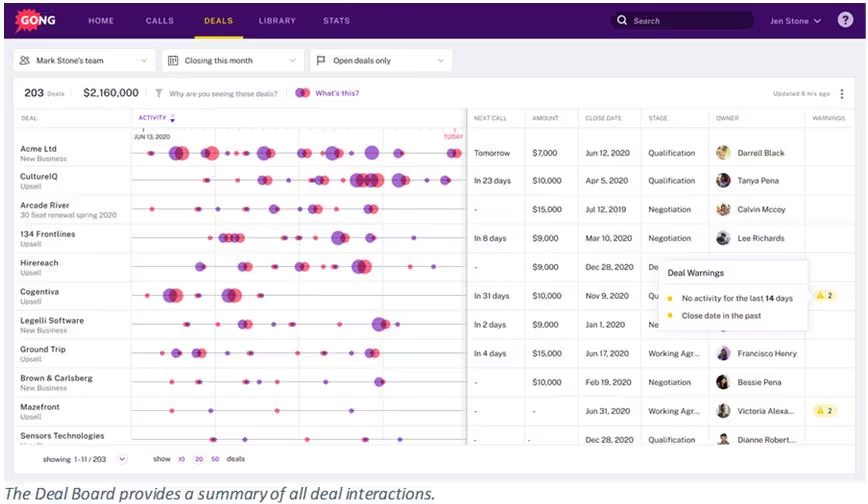
You can’t coach what you don’t hear. Gong analyzes calls to give leaders visibility into rep behavior and deal risks.
Key features:
- Conversation intelligence: Automatically records and transcribes sales calls, emails, and meetings, then analyzes them to identify trends, risks, and coaching moments.
- Concept tracking (not just keywords): Gong’s AI understands themes, questions, and objections—so you get insights on what’s really happening in the conversation.
- Custom AI models: Train Gong’s AI on your company’s terminology, products, and processes so the platform adapts to your exact sales motion.
- Coaching dashboards: Spot coaching opportunities across teams with call scoring, behavior trends, and side-by-side rep comparisons.
Integrations:
- CRM: Salesforce, HubSpot, Microsoft Dynamics
- Conferencing: Zoom, Microsoft Teams, Webex, GoToMeeting
- Telephony: Dialpad, RingCentral, Aircall, 8x8
- Sales engagement: Outreach, Salesloft
- Collaboration: Slack
Pricing: Custom; license-based with a platform fee that scales by team size.
3. Mindtickle
Best for: Organizations that need formal onboarding, certifications, and readiness tracking—especially in regulated or compliance-heavy industries.
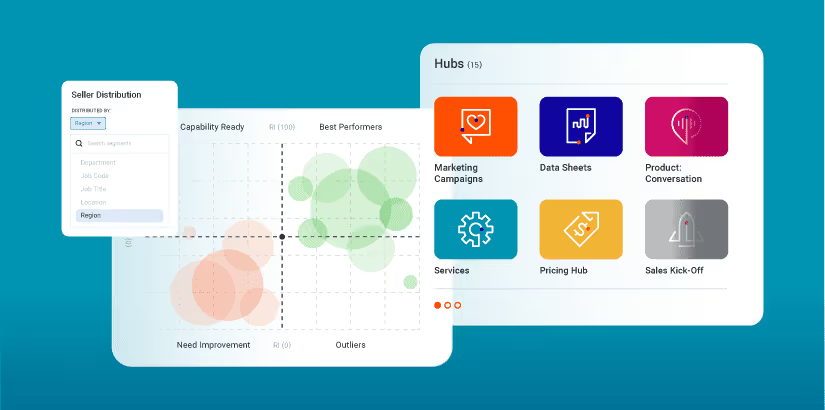
Key features:
- Structured onboarding programs: Build scalable learning paths with milestones, checkpoints, and deadlines across roles or regions.
- Certifications and skills assessments: Validate rep readiness with interactive certifications, role-playing exercises, and peer or manager evaluations.
- Video-based coaching and feedback: Let reps practice pitches, respond to prompts, and get scored feedback on delivery.
- Gamification and engagement tools: Boost rep participation with points, leaderboards, and progress tracking to keep training momentum high.
- Readiness analytics: Track who’s completed training, where they’re getting stuck, and how enablement affects performance at the team or individual level.
Integrations:
- CRM: Salesforce
- Collaboration: Slack, Microsoft Teams
- Video and conferencing: Zoom
- Content and storage: Google Drive, OneDrive
- Other: Workday, Seismic, plus API for custom integrations
Pricing: Custom; typically mid-to-enterprise range, depending on scale and features.
A 4-step evaluation grid to use before you reach out to an AI enablement software provider
This framework comes straight from Spekit CEO Melanie Fellay’s book Just-In-Time: The Future of Enablement in a World of AI.
Avoid the “shiny-object” trap. The one where flashy demos, slick UIs, and buzzwords distract you from the main goal: solving your actual enablement problems.
Before you take a single demo, map out what matters most. Here’s the simple evaluation grid Melanie recommends:
👉🏼 Next steps:
Have everyone on the team rate each solution (1–5) against your criteria, where 1 is “Doesn’t meet the requirement at all” and 5 is “Exceeds the requirement and adds significant value.” The results give you a clear, unbiased snapshot, so you’re not swayed by the flashiest feature set.
Once you’ve proven the value, buy-in becomes easier when it's time to scale.
FAQs on AI sales enablement
1. Will AI replace enablement roles?
No, but it will change them.
Enablement leaders will spend less time formatting slide decks and more time spotting performance gaps, analyzing what’s working, and reinforcing best practices with the help of AI tools.
As Melanie says in her book, “While AI can automate many tasks, it can’t replicate the empathy, creativity, and critical thinking that humans bring to the table.”
2. What’s the ROI of AI enablement?
Enablement has a hard time proving ROI. We create content and train people, but we can't always link those activities to actual sales results.
Melanie Fellay addresses this directly in Just-In-Time: The Future of Enablement in a World of AI. The key to measuring ROI is minimizing the time between when a rep consumes knowledge and when they apply it.
The shorter that gap, the easier it becomes to correlate enablement efforts with outcomes like win rates, deal velocity, and rep productivity.
Learn more about how to measure success of sales enablement here.
3. Isn’t an AI sales enablement platform just another tool my reps will ignore?
Not if it meets them where they already work. Spekit automatically works on Salesforce, Slack, Outreach, Gmail, and more, so reps don’t have to open a separate tool or remember to search a wiki.
They just get the help they need when they need it.

.avif)


